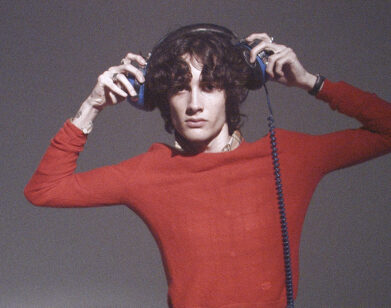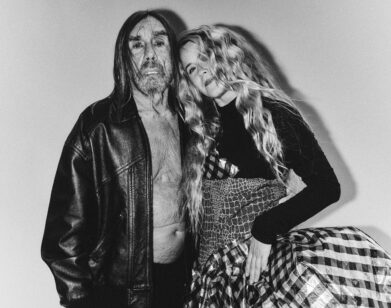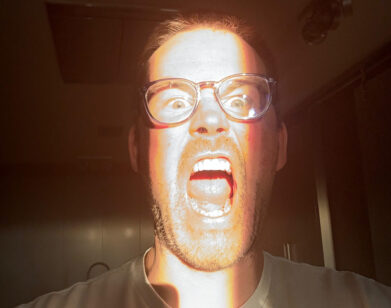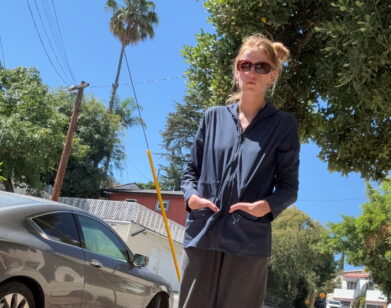Miike Snow
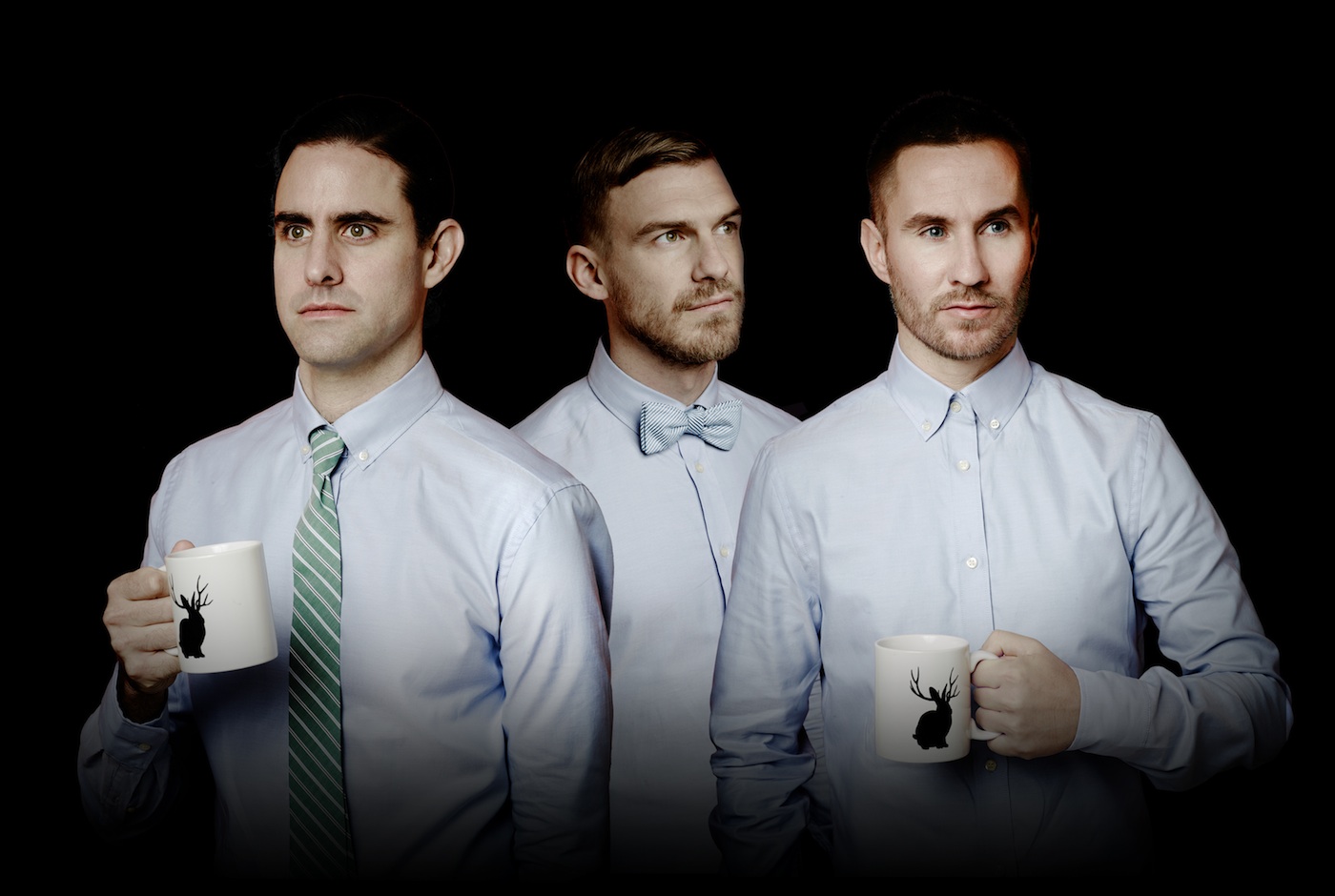
ABOVE: MIIKE SNOW. IMAGE COURTESY OF ANDREAS NILSSON
With the 75th anniversary of the iconic sunglasses manufacturer, Ray-Ban underway, INTERVIEW celebrates the NEVER HIDE moments of a few influential leaders in art, fashion, music and film. We’ve met quite a few characters over the decades, but here are some of our favorite interviewees and icons, artists who never shied away from marching to the beat of their own drum. Here we talk to Miike Snow:
Miike Snow, the jackalope-loving three-man band with one made-up name, returns with their highly anticipated sophomore effort, Happy To You. Though their critically acclaimed eponymous debut, Miike Snow, may appear a hard act to follow, the threesome delivers with a 10-track treasure. With Happy to You, the boys of Miike Snow introduce a sort of fourth member—Jean Noel, a fictional character (caricature?) who features prominently in their futuristic video series, directed by Andreas Nilsson. We recommend that you watch “Paddling Out,” below, and go from there. Also on Miike Snow’s list of launches is their own record label, Ingrid, which they’ve created with fellow musicians, Lykke Li and the members of Peter Bjorn and John.
Comprised of two Swedes and a Manhattanite, Miike Snow stopped in New York recently, en route to Ultra Music Festival, performing an energetic set at Music Hall of Williamsburg. The place was packed and, like last time, the intimate venue brought out their best. If you missed them then, they’ll be live at Terminal 5 for three consecutive shows on April 24, 25, and 26.
Christian Karlsson and singer Andrew Wyatt took a few minutes after sound-check in Brooklyn to chat with us about the wonders and woes of their wild world. Read on for a glimpse into their rock-star lifestyle, from evolving past the party-hard approach towards touring, to drawing inspiration from kung-fu foxes.
NELL ALK: Congratulations on the album! How does it feel to have it finally reach fans?
ANDREW WYATT: It’s always exciting. We hope you connect to it, because that’s really a magical thing. If [we] actually make something that people connect to, that’s important.
ALK: You’ve been quoted saying that this record solidifies you as a band. Can you expand on that?
CHRISTIAN KARLSSON: The first [time], we didn’t know we were making an album. We formed the band and started making music. We were trying to find our sound, song by song, not knowing. We didn’t have any idea what it was. This time, we had 20 months of touring and almost 800 shows. We knew what we were and what the sound of Miike Snow is. Plenty of time [spent] thinking about what we wanted to do for the second record. Completely different experience.
WYATT: There’s a spirit that exists in every band and, if people are into that particular message, then I think on this album we learned to value that. We trusted people would like our vibe and we could do a lot of different things inside of that, which is really fun. I feel like [we’re] communicating to people in an invisible way and, from the responses we’ve been getting, our fans lock into that thing.
ALK: Totally. Sonically it differs, too.
KARLSSON: There’s new layers of production.
WYATT: On the first album, we concentrated on writing very structured pop songs. We would finish the whole song and have [nothing left to do] except mix[ing]. We’d do that in a few days. With this album, we had all these different people scheduled to come; marching bands, an orchestra. The Swedish Army played some drums. We had a string quartet from Stockholm, a couple of trombone players, a French horn guy. We worked with Lykke Li and the drummer from Phoenix, Thomas Hedlund. Then we [had] to edit [everything]. It was very different.
ALK: Speaking of Lykke, can you tell me a bit about your collaborative label, Ingrid?
KARLSSON: We’re all friends and we all kind of do the same thing and have studios in the same neighborhood. Some we share. It’s natural we would do something together.
ALK: Any releases on the horizon?
KARLSSON: There’s one sampler coming up in April. Different pieces of music with all the people involved. We have some other stuff coming later. I can’t say now.
ALK: Fair enough. You performed at Music Hall of Williamsburg last week and in a month you’ll be back to play three sold out shows at Terminal 5. How would you compare these environments?
KARLSSON: It’s different vibes. I like both. There’s something that feels just a little bit easier when it’s smaller. Easier to communicate with each other onstage.
WYATT: To hear each other and respond to each other and bounce off of what’s happening in the audience. I also think that we have so much stuff on stage right now that it’s sometimes easier to play in a bigger place, because we have a bigger stage and can move around more easily.
ALK: I interviewed Gaspard Augé of Justice, and he said performing at places like T5 renders them basically blind.
WYATT: When the lights are on your face in Terminal 5, it is hard to see anything that’s going on with the people in the crowd. Sometimes that can be good and sometimes that can be not good. You want to feed off of that energy.
ALK: Makes sense. On the topic of concerts, any interesting tour tales?
WYATT: Do you have time for Cocksucker Blues 2?! The first time around there was a lot of partying and a lot of late nights. We would stack the dates so consecutively, and the only viable activity at night was drinking. By the end of a touring cycle, that combines to break down one’s physiology. This time we’re a bit wiser and older. [We] realize [we] can’t tour too hard. We have to take care of ourselves a little bit more and not go so all in. I don’t regret having done that at all, but…
ALK: Was there a particular location you felt was worst in terms of this sort of reckless lifestyle?
KARLSSON: South America.
WYATT: That stands out as one of the most bizarrely damaging of all the tours, and in some ways the most fun.
KARLSSON: No sleep, no food.
WYATT: Flying every morning, playing every night. Having only a few hours between breakdown and airport. And a lot of nefarious people showing up after the show.
ALK: Yikes. I don’t know how you do it.
KARLSSON: I have a story! I forgot about this. We were in the UK. On the freeway in the middle of the night, the bus’s trunk opened and all our gear, 100 cases (they’re on wheels), one by one, was going out on the freeway. Could have killed a lot of people. They kept moving to the side, but could have gone straight out in fucking traffic. And the bus was just going boom boom, dropping things.
WYATT: It was so late at night. It was in the middle of the Midlands. I was fast asleep. I didn’t even know.
ALK: Close call. Your mention of the freeway makes me think of the highway scenes in the latest installment of the Jean Noel saga. How did this “perfect human” come about?
KARLSSON: We did all our videos together with Andreas Nilsson. We’re big fans. We worked with him in the past as well. We took a lot of time, just sit[ting] with him—
WYATT: He hung out, heard the kind of stuff we talk about in the studio, saw how we have our studio decorated, pulled a lot out of that.
ALK: By what might he have been inspired?
WYATT: Chinese 3D kung-fu posters. A guy with the head of a fox who’s actually able to do kung fu, in 3D on a poster. It’s a really great thing.
ALK: Is this the ABBA studio I’ve read about?
KARLSSON: No, that studio’s actually across the street. We have three studios.
ALK: Why three?
WYATT: There’s three of us! Count us! One-two-three!
ALK: So this unconventional “perfect human,” with a nose job thanks to a chainsaw, isn’t intended as a commentary on contemporary culture and how we perceive beauty?
WYATT: We do think and talk about that and we’re really shocked at the amount of plastic surgery that’s going on. But I wouldn’t say we were explicitly going for a message. We just wanted to put some cool images together and let people draw their own conclusions.
ALK: Gotcha. Having grown up in New York, and splitting your time between here and Sweden, Andrew, how does it feel whenever you return?
WYATT: It feels amazing. It’s my home. It’s been my home forever. I don’t know whether its magnetic fields feel proper to me or something, the water, the time zone. It all just lines up. I’m a happier, more stable person when I’m home. I’ve been living here for so long. I’ve got friends who have their hands in just about every kind of interesting thing. I’m lucky that way. I feel like it’s a great thing to come home to.
HAPPY TO YOU IS OUT NOW.

